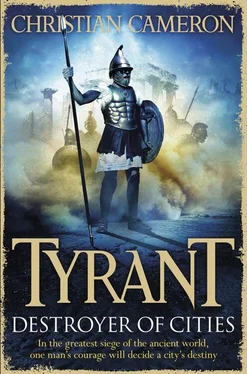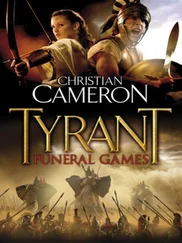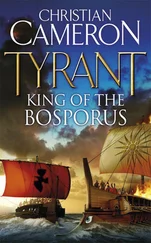Christian Cameron - Destroyer of Cities
Здесь есть возможность читать онлайн «Christian Cameron - Destroyer of Cities» весь текст электронной книги совершенно бесплатно (целиком полную версию без сокращений). В некоторых случаях можно слушать аудио, скачать через торрент в формате fb2 и присутствует краткое содержание. Год выпуска: 0101, Издательство: Orion Books, Жанр: Исторические приключения, на английском языке. Описание произведения, (предисловие) а так же отзывы посетителей доступны на портале библиотеки ЛибКат.
- Название:Destroyer of Cities
- Автор:
- Издательство:Orion Books
- Жанр:
- Год:0101
- ISBN:нет данных
- Рейтинг книги:5 / 5. Голосов: 1
-
Избранное:Добавить в избранное
- Отзывы:
-
Ваша оценка:
- 100
- 1
- 2
- 3
- 4
- 5
Destroyer of Cities: краткое содержание, описание и аннотация
Предлагаем к чтению аннотацию, описание, краткое содержание или предисловие (зависит от того, что написал сам автор книги «Destroyer of Cities»). Если вы не нашли необходимую информацию о книге — напишите в комментариях, мы постараемся отыскать её.
Destroyer of Cities — читать онлайн бесплатно полную книгу (весь текст) целиком
Ниже представлен текст книги, разбитый по страницам. Система сохранения места последней прочитанной страницы, позволяет с удобством читать онлайн бесплатно книгу «Destroyer of Cities», без необходимости каждый раз заново искать на чём Вы остановились. Поставьте закладку, и сможете в любой момент перейти на страницу, на которой закончили чтение.
Интервал:
Закладка:
The broken nose and the odd motions of her face told that this was a woman who had been beaten — many times. ‘Who are they?’ Melitta asked.
‘Sauromatae?’ asked Scopasis. The Sauromatae had become the enemies of the Assagetae, but it had been three years since their defeat and now many of the beaten tribesmen had simply moved into the tribes of the victorious — as was always the way on the plains. Many of the men and women gathered around the assembly were Sauromatae, but they were no longer the ‘people of Upazan’, the leader who had ridden to defeat and death. Now they were her own people. Scopasis’ failure to understand these things was one of the reasons he could never be her consort.
‘They were not Sauromatae,’ Astis said. She gave her curious laugh again. ‘In the year of the War, Sauromatae came and burned our farm and my father took us and led us into the woods. I killed a Sauromatae. I know what a Sauromatae looks like. I know a Sauromatae horse from an Assagetae horse, although I am a farmer.’
That provoked a growl from the assembly.
‘What clan would dare to breach the peace and kill your father?’ Melitta asked. This is bad , she thought, and inwardly she cursed Scopasis for not bringing her this in private — and Thyrsis for not bringing the matter to her attention before the assembly. If one of the clans had done this. . so much for her pleasant spring progress.
‘No clan of Assagetae,’ Astis said.
Now she had silence. Every ear was turned to her. Melitta found herself leaning forward.
‘They call themselves Parni ,’ she said. ‘Big men with yellow hair from the east. What they speak is like Sakje, but not Sakje. I heard them say that after they take Hyrkania, they will come here.’ She looked around. ‘I went with them, east of the Kaspian Sea. Twenty days east of the salt water.’ She raised her mad eyes and Melitta looked into them — into a year of horror, slavery, beatings and rapes, degradation. ‘I ask for revenge — for my father and brothers, for my sisters who died under them.’
Melitta rose. ‘Astis, you have suffered, and we will discuss your revenge, but this is not a matter for the assembly. I cannot offer a single judgement on this, the way I might on the murder of one man by another. If we are to punish these Parni, it would require the agreement of a dozen clan leaders. But when we meet, I will ask you to speak.’
A hundred heartbeats later, in the relative privacy of her own tent, she turned on Scopasis.
‘Why was I not warned?’ she asked. ‘This is a matter for all the Assagetae!’
Scopasis shrugged. ‘A woman was taken in a raid,’ he said. ‘These things happen.’
‘Artemis! Gentle lady, deadly archer — Scopasis, are you a fool? This is not a simple abduction. That woman has been used — brutally. And not by some tribal youngling with a delusion of power — this is some clan about which we know nothing, attacking our high-plains farmers!’
Thyrsis pushed into the tent behind Scopasis. Melitta’s main tent space was big enough for four men on horseback. She waved her hand automatically, inviting him to sit. ‘Wine for my guests,’ she said to her servants. She and her brother had outlawed slavery in the city of Tanais — but the Assagetae had paid no attention at all. They had slaves, especially after a successful war.
‘Pardon me, lady,’ Thyrsis said.
‘And you!’ she turned on him. ‘If he’s a fool, you’re two fools — once for not warning me in advance, and again for not sending her to Tanais.’
Scopasis was angry, she could see that. No man enjoys being called a fool in front of a rival. But Thyrsis bore her anger easily.
‘Lady, this woman presented herself to me just yesterday, when I came into the camp. She travelled far to the north, and came among us with the Standing Horses, even though she is one of ours. And she is from far to the east, lady — I’m not even sure that she can claim to be one of our people, except that her father served with Temerix — and I did not even know that until she brought the smith to me this morning. Then this one,’ Thyrsis pointed at Scopasis, ‘told me that it was a matter of little moment, and that you would deal with it in due time.’
Melitta turned on Scopasis. He shrugged. ‘I was wrong, it appears. I cannot always be correct.’
Melitta drew breath to speak her mind — and all but bit her tongue. The Lady of the Assagetae was not the same person as Melitta, lover of Scopasis, nor yet again the same person as the warrior Smells Like Death. In Assagetae terms, these were different people who shared her body — a belief that would have angered Aristotle, she thought. Regardless, if she unleashed her rage on Scopasis-
‘We will talk of this later,’ she said. ‘In the meantime, you can best serve me by summoning the clan leaders.’
The Tanja was the largest in years — so most of her clan leaders were readily available. Parshevaelt of the Cruel Hands, with Kairax, were close by, and came to her tent before the wine was poured. Urvara’s daughter Listra Red-Hand was just sixteen — but Urvara had inherited the Grass Cats from her father at a young age, and Listra had already killed men in battle, led the great hunts for which her people were famous and was undisputed lady of the clan.
The lords of the Silent Wolves and the Hungry Crows were harder to find, and were less her men. Their clans had come late to the great fight at Tanais River — perhaps due to some treachery, and perhaps not. Her decision to give them only small shares of the spoils had been popular with her other clans — but not with them.
And in truth, clans came and went from the great tribes such as the Assagetae in the same way that warriors came and went from clans. The People of Ataelus now numbered more Sauromatae than Assagetae — while the Grass Cats had absorbed many of the former Standing Horses, and the current Standing Horse clan was a pale shadow of its former numbers although its new lord, Sindispharnax, was rebuilding. He had so few warriors that he might not have warranted a place in her council but he was a member of her household, one of her own knights, and he was already present. Besides, she wanted him to succeed in rebuilding what had once been the greatest of clans, after the Cruel Hands.
To foreigners, the Horse People — the Sky People, as they called themselves — were a mass of faceless nomads with an alien, impenetrable, unchanging society. The Greek called them the Royal Scythians. But Melitta knew that they were as changeable as the sea, as different, tribe by tribe, as Athenians and Spartans.
Tuarn of the Hungry Crows was next — small, dark-haired and bearing an uncanny resemblance to his totem animal, from his stooped shoulders to his beak of a nose. He took his wine with a good grace and his eyes twinkled.
‘I gather we have a border problem,’ he said.
Scopasis stood stiffly by his side. ‘I explained,’ he said, like a man who fears that anything he does will prove to be wrong.
Kontarus was last, lord of the Silent Wolves. He was old and bent, and his tanist, a tall, thin woman with remarkably red hair, stood at his arm, supporting him. He glanced around, refused the wine and grunted. ‘Saida,’ he said, pointing at the red-haired woman. His tone suggested that he was not pleased to be summoned.
Melitta couldn’t decide whether Saida was haughty or merely nervous. She’d never been introduced. Melitta crossed the carpet to her and offered her hand to clasp. ‘Saida, I’m Melitta,’ she said with deliberate informality.
‘Yes,’ Saida said. ‘I know.’ She took the hand clasp as lightly as possible, as though Melitta’s touch held some disease.
Melitta refused to act like a boy. ‘You are the daughter of Kontarus?’ she asked.
Читать дальшеИнтервал:
Закладка:
Похожие книги на «Destroyer of Cities»
Представляем Вашему вниманию похожие книги на «Destroyer of Cities» списком для выбора. Мы отобрали схожую по названию и смыслу литературу в надежде предоставить читателям больше вариантов отыскать новые, интересные, ещё непрочитанные произведения.
Обсуждение, отзывы о книге «Destroyer of Cities» и просто собственные мнения читателей. Оставьте ваши комментарии, напишите, что Вы думаете о произведении, его смысле или главных героях. Укажите что конкретно понравилось, а что нет, и почему Вы так считаете.












